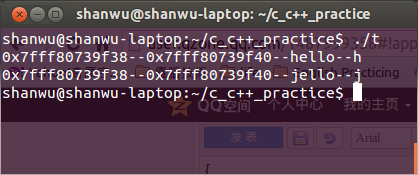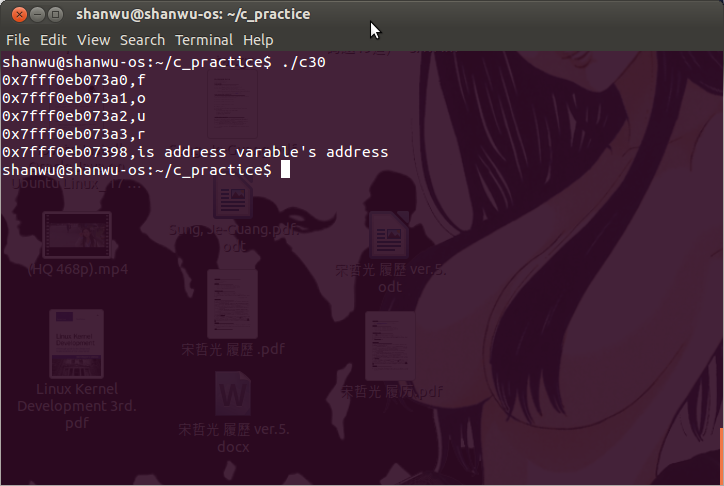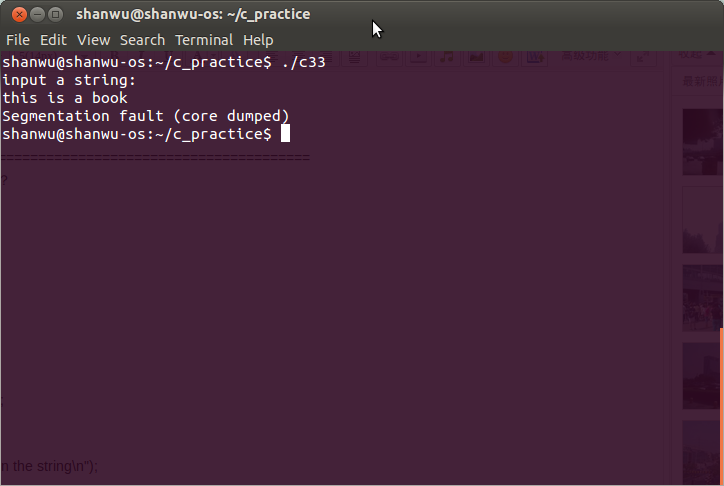範例一:
#include <stdio.h>
int main()
{
int a=4;
int b=3;
int *a_ptr;
int *b_ptr;
b_ptr=&b;
a_ptr=&a;
printf("%x %d\n",a_ptr,*a_ptr);
printf("%x %d\n",b_ptr,*b_ptr);
return 0;
}
範例二:
#include <stdio.h>
void inc_count(int *count_ptr)
{
(*count_ptr)++;
}
int main()
{
int count=0;
while(count<10)
{
inc_count(&count);
printf("%d\n",count);
}
return 0;
}
一、當你使用以下的語法時:
const char *a_ptr = "bitch";
以上的code 其實是告訴 C 被 a_ptr指到的資料是一個 constant,不能被改變;而
a_ptr 指向的位置,其實還是能改變的,如:
#include <stdio.h>
#include <string.h>
int main()
{
const char *a_ptr="bitch"; //此代表的是 ptr指向一個 const char array,
printf("%x, %s\n",&a_ptr,a_ptr); //ptr仍可assign其它的值,但是 *a_ptr則不能再assign
a_ptr="whore";
printf("%x, %s\n",&a_ptr,a_ptr);
return 0;
}
另一范例:
main()
{
char *ptr="hello";
printf("%p--%p--%s--%c\n",&ptr,ptr,ptr,*ptr); // ptr 是 "hello" 首位址,*ptr及为第一个位址的内容
*ptr='v'; // 错误! “hello” 所在之内存位置为文字常量区,不能更改其值
// ref: http://blog.csdn.net/chenke1988/article/details/7273375
// ref: http://zhidao.baidu.com/question/498837142.html
printf("%p--%p--%s--%c\n",&ptr,ptr,ptr,*ptr);
}
经修改:

在加了 const 变成 const *char ptr; 後
main()
{
char a[]="hello",*ptr;
ptr=a;
printf("%p--%p--%s--%c\n",&ptr,ptr,ptr,*ptr);
*ptr='j';
printf("%p--%p--%s--%c\n",&ptr,ptr,ptr,*ptr);
}<span style="font-family: Arial; background-color: rgb(255, 255, 255);"> </span>
在加了 const 变成 const *char ptr; 後
main()
{
char a[]="hello";
const char *ptr=a; //ptr的指向的位置可改,其指向的内容不可改
printf("%p--%p--%s--%c\n",&ptr,ptr,ptr,*ptr);
*ptr='j';
printf("%p--%p--%s--%c\n",&ptr,ptr,ptr,*ptr);
}
二、但是如果將 const 放到 * 之後,則代表 pointer 是個 const 如:
ex1:
#include <stdio.h>
#include <string.h>
int main()
{
char *const a_ptr="bitch"; // 代表 a_ptr是一個constant的pointer,不能被改變
// 而被指的資料,則可以被改變
//a_ptr="new"; 非法
*a_ptr="whore"; //合法,但直接出現錯誤訊息後關掉程式 囧
return 0;
}
ex2:

而 ptr指向的地址不能改

main()
{
char a[]="hello";
char *const ptr=a; //ptr的指向的位置为const,其指向内容可改
printf("%p--%p--%s--%c\n",&ptr,ptr,ptr,*ptr);
*ptr='j';
printf("%p--%p--%s--%c\n",&ptr,ptr,ptr,*ptr);
}
而 ptr指向的地址不能改
main()
{
char a[]="hello";
char b[]="jello";
char *const ptr=a;
printf("%p--%p--%s--%c\n",&ptr,ptr,ptr,*ptr);
ptr=b;
printf("%p--%p--%s--%c\n",&ptr,ptr,ptr,*ptr);
}

三、而如果將const 放在二個地方的話,則產生了一個pointer 固定指向一個constant 的data,如:
const char *const a_ptr="adventure";
note: char const *ptr 和 const char *ptr 意思是一样的,就是其所指的内容为常数,不可更动。
note: char const *ptr 和 const char *ptr 意思是一样的,就是其所指的内容为常数,不可更动。
#include <stdio.h>
#include <string.h>
int main()
{
char array[5]="four";
char *array_ptr=&array[0];
printf("%-10p,%c\n",array_ptr,*array_ptr);
array_ptr++;
printf("%-10p,%c\n",array_ptr,*array_ptr);
array_ptr++;
printf("%-10p,%c\n",array_ptr,*array_ptr);
array_ptr++;
printf("%-10p,%c\n",array_ptr,*array_ptr);
printf("%-10p,is address varable's address\n",&array_ptr);
return 0;
}
當print pointer的時候,要使用 %p,详参
printf() 涵数使用方式
#include <stdio.h>
swap(int *a, int *b)
{
int tmp;
tmp= *a;
*a = *b;
*b = tmp;
}
// int *a, *b 都是形参,所以在涵数结束後,就消失了,
// 因此不能达到 swap 的效果,所以我们该做的是改变指针指向
// 的内容,而不是指针的位置
swap_bad(int *a,int *b)
{
int *tmp;
tmp =a;
a=b;
b=tmp;
}
main()
{
int a=2,b=3;
printf("a =%d, b=%d\n",a,b);
swap_bad(&a,&b);
printf("a =%d, b=%d\n",a,b);
}
但为啥没有初始化 ps,便会产生错误?

因为没有给ps指针分配内存空间,导致出现段错误。
ps=st不会报错,是因为之前ps指向了st,有了 20个字节空间
如果不想段错误一种是和st一样
栈(stack)分配空间
也可以堆(heap)分配
ref:
http://bbs.csdn.net/topics/390599138
copy String with pointer

main(){
char st[20],*ps;
int i;
printf("input a string:\n");
ps=st;
scanf("%s",ps);
for(i=0;ps[i]!='\0';i++)
if(ps[i]=='k'){
printf("there is a 'k' in the string\n");
break;
}
if(ps[i]=='\0') printf("There is no 'k' in the string\n");
}<span style="font-family: Arial; background-color: rgb(255, 255, 255);"> </span>ps=st不会报错,是因为之前ps指向了st,有了 20个字节空间
如果不想段错误一种是和st一样
栈(stack)分配空间
|
1
|
char
ps[20];
|
|
1
2
|
#include <unistd.h>
char
*ps = (
char
*)
malloc
(20);
|
copy String with pointer
#include <stdio.h>
cpystr(char *src,char *dst)
{
//在此処将来源(src)的值复制到目的地(dst)并加以判断
while((*dst=*src)!='\0')
{
src++;
dst++;
}
// 可以简化为 cprstr(char *pss,char*pds) {while ((*pds++=*pss++)!=`\0');}
// 再进一步简化为: cprstr (char *pss,char *pds) {while (*pdss++=*pss++);}
}
main()
{
char *source="china", *destination,a[10];
// 对 pointer 进行复始化,没了这一行,会有 Segmentation Fault 报错,why? ANS:
destination=a;
cpystr(source,destination);
printf("origin: %s, after: %s\n",source,destination);
}
int argc指的是執行程式有argument數,如:
#hello -v
其 argc 即為 2 而char *argv[ ]是指向argument的char array pointer ,在
#hello -v -h -o 中,
"hello" 在 argv[0] ;
"-v" 在argv[1];
"-h" 在argv[2];
"-o" 在argv[3]
argv[1][0]是 "-" 而argv[1][1] 是 "v"
argv[2][0]是 "-" 而argv[2][1] 是 "h"
等等
#include "stdafx.h"
#include <stdio.h>
#include <stdlib.h>
char *out_file="print.out";
char *program_name;
void first_function(void)
{
printf("this is the first function\n");
}
void program_description(void)
{
fprintf(stderr,"%s is a program for blabla use\n",program_name);
}
int main(int argc, char *argv[])
{
program_name=argv[0];
while ((argc>1)&&(argv[1][0]=='-'))
{
switch (argv[1][1])
{
case 'h':
program_description();
break;
case 'e1':
first_function();
break;
}
++argv;
--argc;
}
if(argc==1)
{
first_function();
}
else
{
while (argc>1)
{
first_function();
++argv;
--argc;
}
}
}




















 3545
3545











 被折叠的 条评论
为什么被折叠?
被折叠的 条评论
为什么被折叠?








